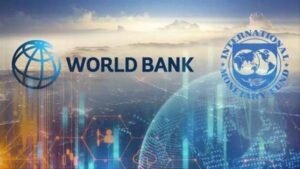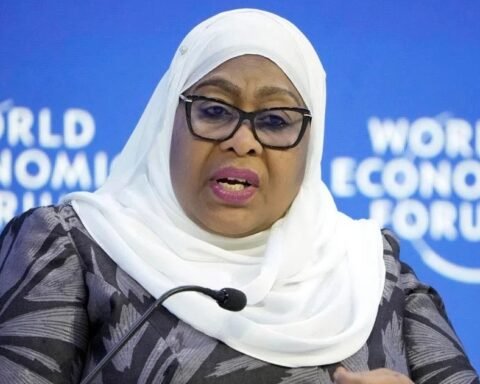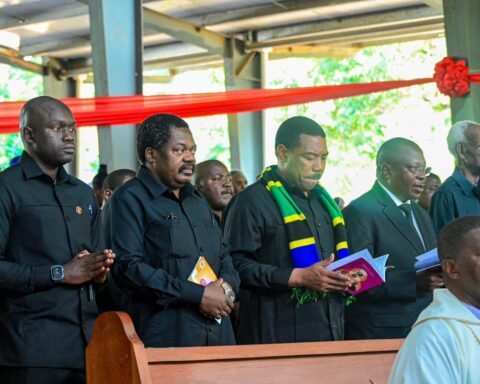As global powers tighten financial rules and reinforce dollar dominance, Tanzania faces renewed pressure to balance stability with sovereignty.
Economists warn that Western-imposed financial frameworks — from IMF conditionalities to new global tax regimes – risk narrowing the country’s economic policy space.
Increasingly, officials and scholars are asking whether Tanzania should pivot toward gold-backed reserves and BRICS-aligned financial systems to reclaim independence in monetary policy.
For decades, the United States and its allies have anchored the global financial order around the dollar. Nearly 60% of global reserves and most international trade settlements remain dollar-denominated, giving Washington and Western institutions extraordinary leverage over developing economies.
Tanzania’s reliance on IMF and World Bank programs illustrates the dilemma. The current US$1.25 billion Extended Credit Facility (ECF) and Resilience and Sustainability Facility (RSF) have supported macroeconomic stability and post-pandemic recovery, but the attached structural conditions influence everything from tax policy to fuel subsidies.
“Such arrangements help us stabilize the shilling and control inflation, but they also come with prescriptions that may not fit local realities,” said Prof. Humphrey Moshi, an economist at the University of Dar es Salaam.
“When every fiscal decision is tied to performance reviews in Washington or Brussels, sovereignty becomes negotiable.”

Other officials privately concede that Tanzania’s fiscal flexibility is shrinking. IMF programs typically require governments to cap spending, raise domestic revenue, and maintain tight monetary targets — measures often welcomed by investors but viewed by domestic industries as restrictive.
The New Pressure: Global Minimum Tax
Western governments are now pushing a 15% global minimum corporate tax to curb profit shifting by multinationals. While framed as a fairness measure, analysts argue it could weaken developing economies’ ability to attract foreign investment through competitive tax regimes.
“Tanzania risks losing one of its few remaining levers to influence investor behavior,” said a senior official at the Ministry of Finance, speaking on condition of anonymity.
“We already face scrutiny from lenders when offering tax holidays or incentives. A universal floor limits our maneuverability even further.”

The OECD-backed tax deal is expected to be implemented globally by 2026. African finance ministers, including from Tanzania, have urged that any revenue gains be equitably distributed and that developing countries not become passive recipients of rules written elsewhere.
Against this backdrop, the BRICS bloc — Brazil, Russia, India, China and South Africa — is advancing alternative financial mechanisms, including the New Development Bank (NDB) and BRICS Pay, a cross-border digital payment system designed to bypass dollar settlements.
Several African nations, including Egypt and Ethiopia, have applied to join BRICS. Tanzanian policymakers are quietly studying the implications.
“Diversification is key,” said Prof. Pantaleo Kessy, another UDSM economist. “Our trade with China, India and South Africa already exceeds that with Europe. It makes sense to explore a financial system that reflects our actual economic partners rather than legacy alignments.”
Tanzania’s gold wealth gives the debate additional weight. Gold now accounts for roughly 45% of the country’s export earnings, and the Bank of Tanzania has steadily increased its bullion reserves.
A partial gold-backed reserve framework, economists suggest, could reduce exposure to dollar volatility and improve the credibility of the shilling.
However, experts caution that gold is not a substitute for sound policy. “Gold offers security, but it’s not a growth engine,” said a senior central bank official. “Reserves are insurance, not income. The challenge is to integrate gold into a broader monetary strategy.”
moving toward BRICS or gold-linked reserves would mark a major geopolitical and economic shift. Tanzania would gain leverage and policy independence, but might also face capital flight or higher borrowing costs if Western investors interpret the move as political defiance.
The IMF and World Bank remain major funders of Tanzanian infrastructure and social programs. In 2025, the IMF disbursed another US$153 million under the RSF to support climate adaptation. Withdrawing abruptly from such arrangements could disrupt fiscal planning and social spending.
Analysts therefore recommend a dual-track approach: deepen engagement with regional and BRICS financial systems while maintaining dialogue with traditional partners. “Sovereignty doesn’t mean isolation,” said Prof. Moshi. “It means the ability to choose — without coercion — what serves national interest.”
Policy advisers in Dodoma are now discussing a framework of “Financial Non-Alignment,” inspired by Tanzania’s Cold War foreign policy doctrine. The idea is to diversify partners, currencies, and reserve holdings to ensure no single bloc can dictate terms.
Under this doctrine, Tanzania could: Expand gold and non-dollar reserves; negotiate bilateral swap lines within SADC and East Africa; Channel infrastructure financing through BRICS banks and regional funds; Retain IMF and World Bank membership but demand greater flexibility in program design.
This pragmatic stance would position Tanzania as a bridge between global systems, not a pawn within them.
Ultimately, the debate over dollarization and global taxation is about more than money — it is about political power. Control over currency, credit, and taxation equals control over national destiny.
For Tanzania, which has long championed independence and Pan-African cooperation, the path forward lies in combining fiscal discipline with assertive diversification.
Gold reserves can underpin confidence; BRICS membership can expand policy space; but the real currency of sovereignty remains institutional strength — the capacity to design, defend, and finance one’s own development agenda.
As Western-imposed financial frameworks tighten, Tanzania’s challenge is to stay open to the world without being owned by it.







